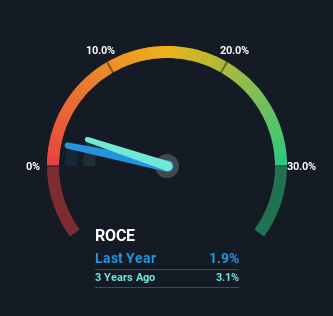
If we're looking to avoid a business that is in decline, what are the trends that can warn us ahead of time? Typically, we'll see the trend of both return on capital employed (ROCE) declining and this usually coincides with a decreasing amount of capital employed. Basically the company is earning less on its investments and it is also reducing its total assets. So after glancing at the trends within Tenma (TSE:7958), we weren't too hopeful.
What Is Return On Capital Employed (ROCE)?
For those who don't know, ROCE is a measure of a company's yearly pre-tax profit (its return), relative to the capital employed in the business. The formula for this calculation on Tenma is:
Return on Capital Employed = Earnings Before Interest and Tax (EBIT) ÷ (Total Assets - Current Liabilities)
0.019 = JP¥1.7b ÷ (JP¥105b - JP¥18b) (Based on the trailing twelve months to December 2024).
Therefore, Tenma has an ROCE of 1.9%. Ultimately, that's a low return and it under-performs the Chemicals industry average of 7.2%.
View our latest analysis for Tenma

While the past is not representative of the future, it can be helpful to know how a company has performed historically, which is why we have this chart above. If you're interested in investigating Tenma's past further, check out this free graph covering Tenma's past earnings, revenue and cash flow.
What The Trend Of ROCE Can Tell Us
There is reason to be cautious about Tenma, given the returns are trending downwards. To be more specific, the ROCE was 4.2% five years ago, but since then it has dropped noticeably. And on the capital employed front, the business is utilizing roughly the same amount of capital as it was back then. This combination can be indicative of a mature business that still has areas to deploy capital, but the returns received aren't as high due potentially to new competition or smaller margins. If these trends continue, we wouldn't expect Tenma to turn into a multi-bagger.
The Bottom Line On Tenma's ROCE
All in all, the lower returns from the same amount of capital employed aren't exactly signs of a compounding machine. The market must be rosy on the stock's future because even though the underlying trends aren't too encouraging, the stock has soared 121%. In any case, the current underlying trends don't bode well for long term performance so unless they reverse, we'd start looking elsewhere.
Tenma does have some risks though, and we've spotted 3 warning signs for Tenma that you might be interested in.
While Tenma isn't earning the highest return, check out this free list of companies that are earning high returns on equity with solid balance sheets.
Valuation is complex, but we're here to simplify it.
Discover if Tenma might be undervalued or overvalued with our detailed analysis, featuring fair value estimates, potential risks, dividends, insider trades, and its financial condition.
Access Free AnalysisHave feedback on this article? Concerned about the content? Get in touch with us directly. Alternatively, email editorial-team (at) simplywallst.com.
This article by Simply Wall St is general in nature. We provide commentary based on historical data and analyst forecasts only using an unbiased methodology and our articles are not intended to be financial advice. It does not constitute a recommendation to buy or sell any stock, and does not take account of your objectives, or your financial situation. We aim to bring you long-term focused analysis driven by fundamental data. Note that our analysis may not factor in the latest price-sensitive company announcements or qualitative material. Simply Wall St has no position in any stocks mentioned.
About TSE:7958
Tenma
Engages in the manufacture and sale of plastic products in Japan and internationally.
Flawless balance sheet with proven track record.
Market Insights
Community Narratives




